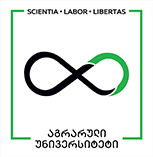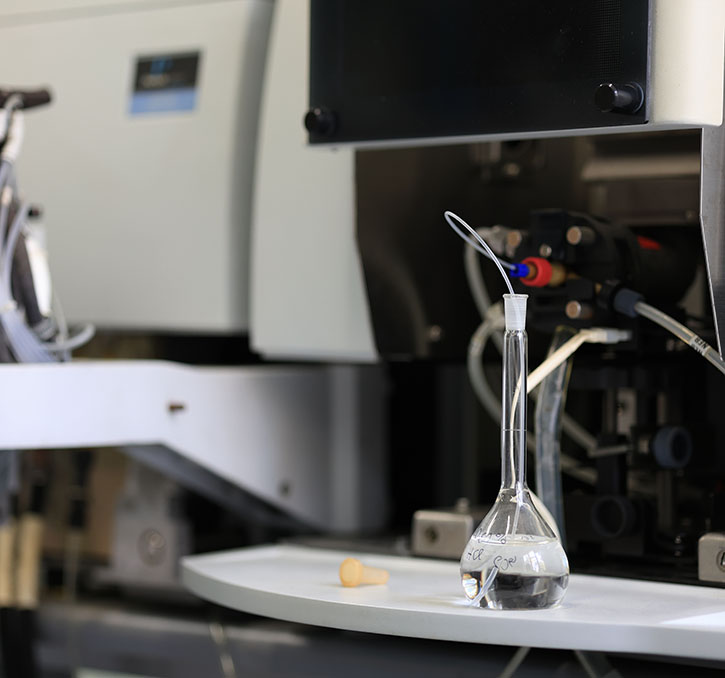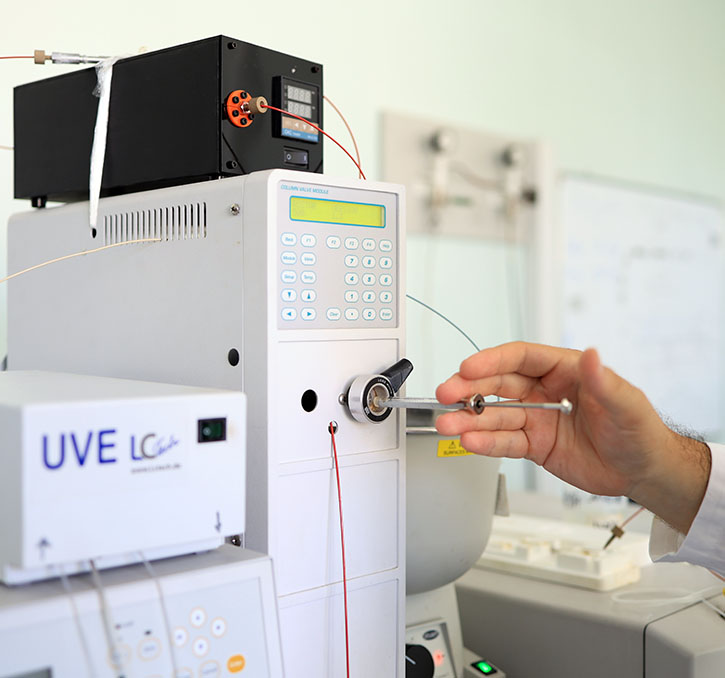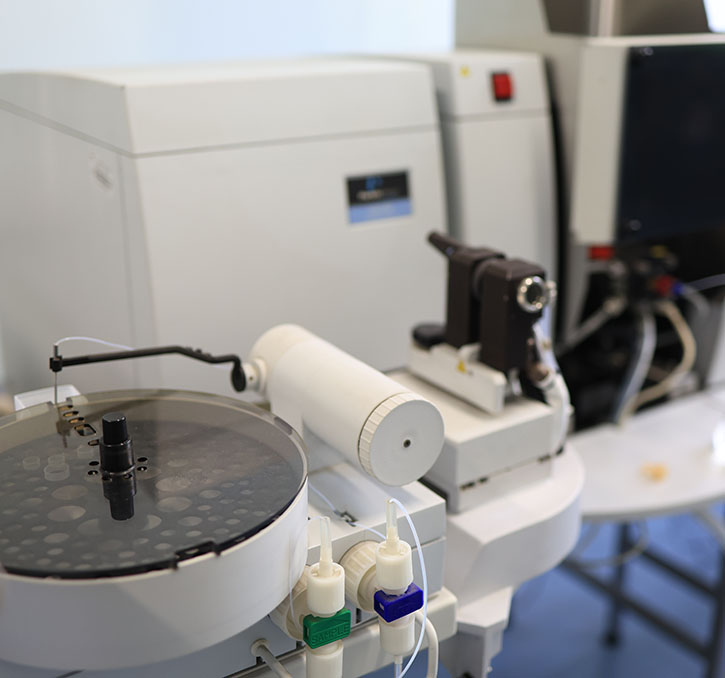TestLAB
TestLab
The Testing Laboratory of the Agricultural University of Georgia, known as "TestLAB," has been accredited since 1997. It has achieved accreditation according to the ISO/IEC 17025:2017/2018 standard.
The Testing Laboratory "TestLAB" has many years of experience and is equipped with modern equipment, including a high-performance liquid chromatograph, gas chromatograph, and stable isotope mass spectrometer. This advanced technology enables the laboratory to determine product quality quickly and with high accuracy, in accordance with standards.
The key to the successful operation of the laboratory is its highly qualified personnel, who have many years of experience in the field.
The scope of the laboratory's accreditation includes the analysis of various products, such as alcoholic beverages, nuts, fruits, vegetables, and their processed products (juice, jam, dried fruit), tea, coffee, and spices, wheat crops and their processed products.
Advantages of TestLab:
- Many years of experience
- High accuracy of analysis
- Modern equipment
- Short analysis performance periods and low prices
- Accessible services
- Special offers for corporate clients
The Testing Laboratory of the Agricultural University of Georgia, known as "TestLAB," has been accredited since 1997. It has achieved accreditation according to the ISO/IEC 17025:2017/2018 standard.
The Testing Laboratory "TestLAB" has many years of experience and is equipped with modern equipment, including a high-performance liquid chromatograph, gas chromatograph, and stable isotope mass spectrometer. This advanced technology enables the laboratory to determine product quality quickly and with high accuracy, in accordance with standards.
The key to the successful operation of the laboratory is its highly qualified personnel, who have many years of experience in the field.
The scope of the laboratory's accreditation includes the analysis of various products, such as alcoholic beverages, nuts, fruits, vegetables, and their processed products (juice, jam, dried fruit), tea, coffee, and spices, wheat crops and their processed products.
Advantages of TestLab:
- Many years of experience
- High accuracy of analysis
- Modern equipment
- Short analysis performance periods and low prices
- Accessible services
- Special offers for corporate clients
Contact Information
Liana Shubladze
Grape, sparkling, aromatic, fruits
- Ethyl alcohol
- Sugar (reducing substances)
- Volatile acids
- Titratable acids
- Sulfur dioxide
- Conditional density
- Common extract
- Ash
- Malvidol diglucoside
- Total anthocyanins
- Folin-Ciocalteu index
- Catechins and caffeine
- Organic acids
- Glucose, fructose
- Anthocyanins
- Sorbic, benzoic, and salicylic acids
- Ascorbic acid
- Ochratoxin A
- Carbon dioxide
- Stable carbon isotope (C13/C12) in alcohol
- Wine sugar (in concentrated juice)
- pH
- Elements: Fe, Cu, Pb, Cd, Hg, As, Ca, K, Na, Zn, Mg
Ethyl alcohol (>80%)
- Purity
Ethyl alcohol (<80%)
- Ethyl alcohol content
- Free acids
- Sugar
- Volatile acids
- Sulfur dioxide
- Relative density
- Common extract
- Reduced extract
- pH
- Stable carbon isotope (C13/C12)
- Elements (Fe, Cu, Pb, Cd, Hg, As, Ca, K, Na, Zn, Mg)
- Toxic micro-impurities: aldehydes, acetals, methacetate, ethyl acetate, higher alcohols, methanol
- Furfural
- Substances obtained as a result of aging in oak (vanillin, lilac aldehyde)
- Sugars
Vinegar
- Residual alcohol
- Total acidity
- Sulfur dioxide
- Volatile acids
- Dry extract
- Ash
- Metals (Cu, Zn, Fe, Pb, Hg, Cd)
- Qualitative pests, appearance, dimensions
- Dry matter
- Sugars
- Titratable acidity
- Ascorbic acid
- Nitrates
- Aflatoxins B1, B2, G1, G2
- Elements (Fe, Cu, Pb, Cd, As, Na, K, Ca, Mg)
- Organochlorine pesticides
- Mesophilic, aerobic, facultative, anaerobic microorganisms
- Pathogenic microorganisms
- Intestinal coliform bacteria
- Yeast and mold fungi
- Qualitative pests, appearance, dimensions
- Humidity
- Fat
- Superoxide number
- Acid number
- Aflatoxins B1, B2, G1, G2
- Ochratoxin A
- Elements (Pb, Cd, Hg, As)
- Mesophilic, aerobic, facultative, anaerobic microorganisms
- Pathogenic microorganisms
- Intestinal coliform bacteria
- Yeasts and mold fungi
- Qualitative pests, appearance, dimensions
- Nitrates
- Organochlorine pesticides
- Elements (Fe, Pb, Cu, Cd, Hg, As, Na, K, Ca, Mg)
- Mesophilic, aerobic, facultative, anaerobic microorganisms
- Pathogenic microorganisms
- Intestinal coliform bacteria
- Yeast and mold fungi
- Sample preparation
- Tightness
- Soluble dry matter
- Titratable acidity
- Sugars
- Nitrogen
- Pectin compounds
- Sulfur dioxide
- Water-soluble substance
- Chlorides
- Ascorbic acid
- Mineral acids
- Nitrates
- pH
- Phosphorus
- Sorbic and benzoic acid
- Stable isotope (C13/C12)
- Mesophilic, aerobic, facultative, anaerobic microorganisms
- Pathogenic microorganisms
- Intestinal coliform bacteria
- Yeast and mold fungi
- Industrial sterility
- Lactic acid microorganisms, mesophilic aerobic
- Sulfate-reducing clostridia
- Moisture
- pH
- Calcium, potassium, magnesium, chlorine, sulfate ions
- Iodine, potassium iodate, potassium iodide, and sodium thiosulfate
- Iron ions
- Elements (Fe, Cu, Pb, Cd, As, Zn)
- Determining impurity free substances
- Moisture
- Common ash
- Foreign impurities
- Mineral impurities and ash
- Water soluble extract
- Cellular content
- Tannin and caffeine
- pH
- Aflatoxins B1, B2, G1, G2
- Ochratoxins A
- Organochlorine pesticides
- Elements (Cu, Pb, Cd, Hg, As)
- Yeast and mold fungi
- Mesophilic, aerobic, facultative, anaerobic microorganisms
- Pathogenic microorganisms
- Intestinal coliform bacteria
- Sulfate-reducing clostridia
- Raw cellulose
- Gluten
- Raw ash
- General grayness
- Acid insoluble ash
- Moisture
- Nitrogen and crude protein
- Protein
- Starch
- Crude fat
- Phosphorus
- Aflatoxins B1, B2, G1, G2
- Ochratoxin A
- Organochlorine pesticides
- Elements (Pb, Cd, As, Hg, K and other microelements)
ISO/IEC 17025:2017/2018 - General requirements for the competence of testing and calibration laboratories
ISO/IEC 17025:2017/2018 is a consensus-based document developed and registered by standards bodies. It establishes rules, general principles, and characteristics for various activities, actions, or results within a specific domain, intended for general and multiple uses.
In Georgia, standards are developed, registered, and disseminated by the Ministry of Economy and Sustainable Development of Georgia and the National Agency for Standards and Metrology of Georgia, a legal entity under public law. The National Agency issues special certificates upon successful accreditation.







